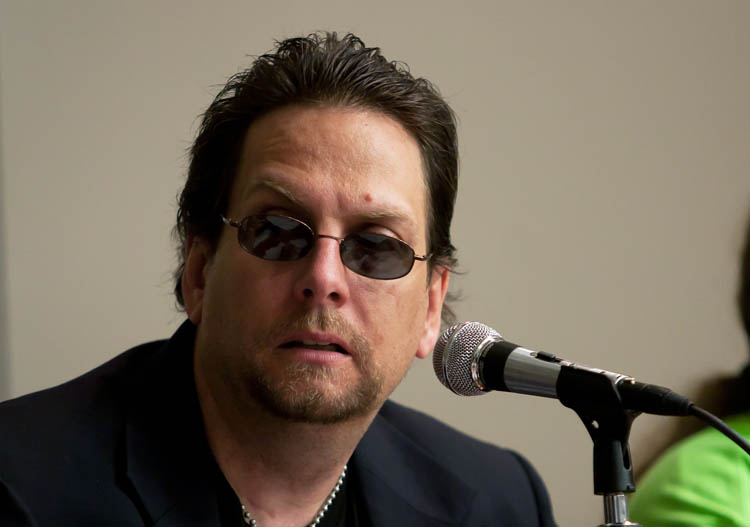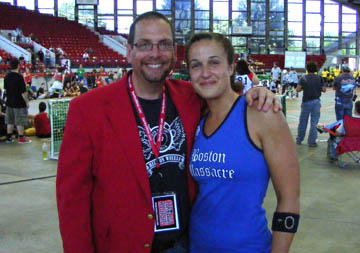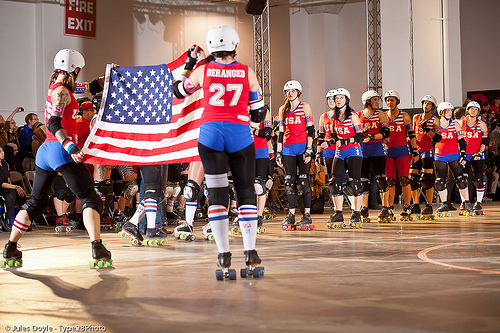
 The Brown Paper Tickets office is still buzzing about the Roller Derby World Cup that was held in Toronto earlier this month. One can’t understate the significance it had to the derby community. The event was the first international gathering of derby teams and supporters and it’s been amazing to watch the sport grow from scrappy, DIY beginnings to international notoriety.
The Brown Paper Tickets office is still buzzing about the Roller Derby World Cup that was held in Toronto earlier this month. One can’t understate the significance it had to the derby community. The event was the first international gathering of derby teams and supporters and it’s been amazing to watch the sport grow from scrappy, DIY beginnings to international notoriety.
Our Alternative Sports Doer Bob Noxious has been with the derby revival pretty much since the beginning. I talked to him recently about the Derby World Cup, his history with the sport and how derby’s growth has mirrored Brown Paper Ticket’s growth. He had lots of interesting things to say. I thought I’d share those with all you derby fans out there.
Ladies and gentlemen, Bob Noxious!
What was the first derby bout that you were involved in.
The first bout I announced was for the opening bout of the inaugural season for the Mad Rollin’ Dolls in Madison, Wisconsin in January of 2005. The league had, and still has, four teams which played during the winter with the ultimate goal of winning the league championship.
The first inter-league bout I announced was the first-ever east of the Mississippi. The Mad Rollin’ Dolls All-Star team, known as the Dairyland Dolls, competed against Gotham Girls Roller Derby’s All-Star team in The Bronx in August of 2005.
How big was the sport when you started?
Madison was the fourth league to publicly bout. There were another 20 or so leagues close on their heels. This was about a year or so following derby’s debut in Austin, Texas. There are likely around 20 of us that have been in the sport as long or longer than I have.
How much has the sport grown since you’ve been involved?
I began with the fourth league in the U.S. To see it seven years later at an astounding 1100 plus leagues on nearly every continent and to have all 50 states occupied with the sport is amazing. Domestically, we sit at around 550 leagues. It’s nearly impossible to keep up with.
How was the Derby World Cup indicative of derby’s growth? Would that event have existed five years ago?
Of those 1100 plus leagues worldwide, just over half are in the United States. That’s a pretty outstanding statistic. It explains how we were ready for an event like the World Cup. What makes that even more incredible is that nearly every one of these countries didn’t have a history of the sport.
In the U.S., derby was huge in the ’40s, ’50s, and ’60s, though the true era of the sport ended around 1973. It was that same year that Comiskey Park, home of the Chicago White Sox, sold out for a banked track bout. Subsequent promoters picked up where the Selzer family, who ran the sport until 1973, left off, turning it into the theatrical, professional wrestling-style sport that it became, complete with crazy antics, choreographed fighting and other ideas that took the “sport” out of the game and eventually contributed to its demise around 1983. So, there is a contingent of U.S. skaters and fans that are familiar with the sport, as it was a staple of independent TV stations nearly every weekend.
This is not so outside of the country. Leagues have flourished outside of the U.S. even though their fans are walking into an event for which they have no point of reference. That might be one of the greatest tributes to the sport’s attraction. Five years ago leagues were getting started in other parts of the world, though it was limited to mostly Canada and the UK. We were not ready for a World Cup at that time. The number of countries ready to participate would have been very limited and the quality of skating would have been poor. It was about four or five years ago that the first bout outside of the US took place as league-teams took the track against each other in Hamilton, Ontario, Canada.
What was your involvement with the Derby World Cup?
I prepared the 22 announcers who came to call the action both live, in the venue as well as on the Web. With two tracks going at a time, it required eight announcers at any given moment. Much of my role was to lay down a solid foundation of information before they arrived. This included announcer logistics, event accommodations, roster updates and round scheduling. Once I was there, I was one of three managing announcers, sitting in on venue calls to make sure the chemistry between the announcers we had scheduled was strong, helping bird-dog any team roster changes, developing their announcing schedule as each round progressed, providing feedback, and just being visible for them should there by any question to answer or problem to resolve.
 How has the growth of roller derby mirrored the growth of Brown Paper Tickets?
How has the growth of roller derby mirrored the growth of Brown Paper Tickets?
The growth of the sport and the company have paralleled each other. Again, Brown Paper Tickets sponsored the very first derby event, the WFTDA Dust Devil Championship Tournament, which featured around 30 teams. At the time, the company was relatively young and rather unknown. As derby grew, so did the capabilities and listings on Brown Paper Tickets. And, it comes as no surprise, that derby contributed to this growth, as Brown Paper Tickets has been the ticketing service of choice for the sport since early on. Currently, I’d guess we ticket 40 percent or more of the US market. It’s,somewhere near 220 leagues. Brown Paper Tickets grew into Canada and Europe right at the time many of their leagues had completed their first season and were ready for a ticketing service. Then Brown Paper Tickets broke into Australia and New Zealand, which accounts for over 100 leagues.
Thanks Bob! What a crazy decade it’s been for derby and Brown Paper Tickets. We’re so proud to be the “ticketing service of choice” for the roller derby community and are lucky to have folks like Bob on our team, providing the expertise that comes from seven years in the business. If you’re a derby league that’s just starting out or one that’s already established, don’t hesitate to drop Bob a line so he can share some of that hard-earned knowledge with you and your team-mates. Here’s to another decade roller derby. We love you!



 Arts
Arts Comedy
Comedy Event Tips
Event Tips Film
Film Food & Drink
Food & Drink Good Causes
Good Causes Music
Music News
News Radio
Radio Roller Derby
Roller Derby